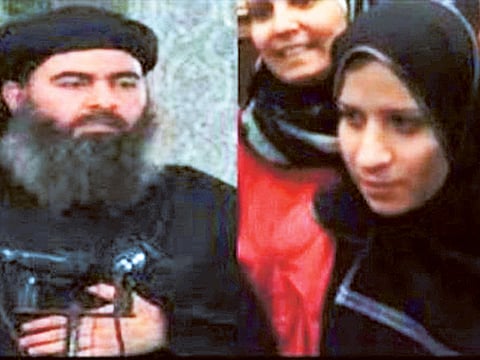Meet the ‘First Lady’ of Daesh
Saja Al Dulaimi is part of a very powerful and wealthy tribe

Beirut: Tracking information about Al Baghdadi’s multiple marriages has been difficult, but apparently three are officially registered and a fourth one is recent, and that was after the establishment of Daesh. All of his wives wear the hijab but not the full-face cover (niqab).
His first wife Asma Fawzi Al Qubaisi, 36, is his cousin and the mother of his five eldest children: Hufaiza, Omayma, Yaman, Hasan and Fatima. Very little is known about her, and none of Daesh’s top generals have ever seen her in public, or knows for sure if she lives with him in Mosul. The second is Israa Rajab Mahal Al Qaisi, the 31-year Iraqi mother of his youngest son Ali. The most recent wife — until proven otherwise — remains the product of social gossip in Al Raqqa. She is reportedly a German woman who joined Daesh early this year. Nobody knows her name or age, but tongues are wagging in Daesh. The third and last confirmed wife — and the one we know the most about — is the young brunette, Saja Al Dulaimi.
A snapshot of her coming out of a Syrian prison in March 2014 was seen. She was released as part of a much-publicised prisoner swap in exchange for nuns kidnapped in the ancient Christian village of Maaloula. The photo revealed her light complexion; she was not wearing black, like all the other women from Daesh, but a long beige coat. On her release, Arab and Western media actively syndicated a photograph saying that this was the ‘first lady’ of Daesh.
Saja was born in 1978 into the powerful Dulaim tribe, a seven-million man strong clan stretched across Iraq, Syria, Jordan and Kuwait. Every Iraqi leader since 1921 has treated them lavishly, and Al Baghdadi is no exception. They were rich, after all, always well-connected trustworthy when it came to a word of honour. Under Saddam, 10-12 per cent of the Iraqi Army was drawn from the Dulaim tribe.
The entire clan fell from official grace with the US occupation of 2003. Like the Baathists of Iraq, they took up arms and headed for the underground, at first leading a secular resistance to the American occupation. When Al Qaida surfaced, Saja’s father Hamid Ebrahim Al Dulaimi joined Abu Musab Al Zarqawi. This is where he befriended Abu Mohammad Al Jolani, the Syrian Al Qaida operative who in turn, introduced him to Abu Bakr Al Baghdadi.
Al Baghdadi saw plenty of reason to marry into the Dulaim tribe, despite the fact that Saja was a widow, her first husband having been killed in 2010.
As a political and social nobody, it would make Al Baghdadi important, providing a tribal umbrella that he desperately needed in Iraqi politics. Al Baghdadi seems to be taking his cue from Saddam Hussain who played tribal politics brilliantly, treating tribal leaders like kings in exchange for unlimited support from their community elders.
The Dulaims have been incorporated into Daesh, with Saja’s brother Omar becoming commander of a Daesh unit in Mosul while her young brother Khalid is part of Al Baghdadi’s entourage.
Her sister Du’aa is an Al Qaida member who tried, and failed, to blow herself up against a crowd in the all-Kurdish city of Arbil back in 2008. Their father was a founding commander of Daesh and a member of its Shura Council. The Syrian Army killed him in September 2013.
There is no official post for Saja Al Dulaimi in Daesh. The wives of caliphs in Islamic history have generally lived in the shadows of their husbands. Al Baghdadi, however, sees a major role for his wife in the future of Daesh.
Although Daesh warriors have done great injustice to the women citizens of Al Raqqa, this contradicts with Al Baghdadi’s vision for the future of his state, or at least, of his four wives. He wants the state’s women to play an active role in society and even fight if needed. One of the manifestations of his vision is the Khansaa Brigade, the all-women unit he created to monitor female activity on the streets of Al Raqqa. Unmarried foreign women who come to Al Raqqa are treated well and lodged with other single female members of Daesh.
They pay no rent and a Daesh officer is charged with running all of their errands from a distance, until each of them is properly wed.
Some of the match-making is done by Saja herself. Widows are given a Daesh pension of $300 (Dh1101) per month — a good amount when converted into Syrian pounds.
European women coming to Daesh are encouraged to complete their university degree before making the lifetime decision.
Al Baghdadi and Saja wanted to revamp university campuses in Mosul and Al Raqqa, restricting one to a women-only institution. Not only would its classes be free-of-charge; but women would get a state grant to complete their higher education.
Al Baghdadi is willing to pay Daesh women — and only Daesh women — in order for them to obtain a higher education.
It is public knowledge in Al Raqqa, says the wife of one Daesh warrior that Al Baghdadi wants to increase the ratio of women in Daesh. He reportedly once said: “This state has no future if it has nothing but men. Never in my life have I heard of a state with no women. We need more women!”
Not only that, Al Baghdadi wants them to be more than “baby factories” and is calling for women engineers, doctors, nurses, teachers and fighters to come to Al Raqqa.
He wants to give women with experience and a university degree who pledge full allegiance to Daesh a plot of land, a fully furnished residence, and astronomically high salaries by the standards of Daesh.



